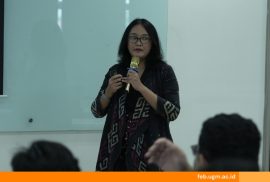Internal audit is one of the most sought-after jobs among accounting graduates. So, what steps should students take to pursue a career in internal audit?
Hibank Indonesia’s Head of Internal Audit, Bagus Rian Mahardhika, shared some tips for students looking to build a career in internal audit. During the Accounting Profession Public Lecture titled “Internal Auditing in the Banking Industry” held on Friday (29/11/2024) at Pertamina Tower Auditorium, FEB UGM, he emphasized the importance of students learning and improving their skills. This can be achieved through relevant training and certification.
Bagus mentioned that students are not only expected to master technical skills but should also strengthen their soft skills and broaden their knowledge beyond the auditing world.
“As an internal auditor, you must understand the industry you are auditing, whether it’s mining, plantations, or any other industry. Also, never stop learning because even after retirement, the requirement as an internal auditor is to keep learning, especially with the advent of digitalization, cybersecurity, and regulations that continue to evolve with the times,” the Management Program alumnus explained.
In the public lecture organized by the Accounting Profession Study Program at FEB UGM, Bagus also shared insights into the profession of internal auditor in the banking sector. He explained that in risk management at banks, the Internal Audit (SKAI) unit is responsible for evaluating the effectiveness of the processes carried out by the supervisory line and the risk management support line to ensure that internal control systems, risks, and governance processes have been effectively implemented.
As the last line of defense, SKAI must also report audit findings and seek approval from the Board of Directors (BOD), the Board of Commissioners, and the Audit Committee. They also have the authority to request access to information, communicate directly with the BOD and Audit Committee, hold regular and ad hoc meetings, coordinate activities with external auditors, and attend strategic meetings. The SKAI’s primary responsibilities are supporting oversight, providing objective analysis, and recommending improvements and efficiencies.
Reportage: Najwah Ariella Puteri
Editor: Kurnia Ekaptiningrum
Sustainable Development Goals







